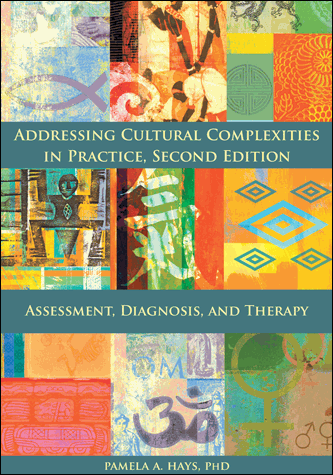Addressing Cultural Complexities in Practice: Assessment, Diagnosis, and Therapy
By Pamela A., Ph.D. Hays
Abstract
This engaging book helps readers move beyond one-dimensional conceptualizations of identity to an understanding of the complex, overlapping cultural influences that form each of us. Pamela Hays’ “ADDRESSING” framework enables therapists to better recognize and understand cultural influences as a multidimensional combination of Age, Developmental and acquired Disabilities, Religion, Ethnicity, Socioeconomic status, Sexual orientation, Indigenous heritage, Native origin, and Gender. Unlike other books on therapy with diverse clients, which tend to focus on working with one particular ethnic group, “Addressing Cultural Complexities in Practice” presents a framework that can be used with a person of any cultural identity.This second edition has been updated throughout and has new sections on cross-cultural assessment of trauma, on psychotherapy with people living in poverty, and on ethical boundaries and complex relationships in rural and minority communities. A special section describes how to integrate cultural considerations into the evidence-based practice of cognitive – behavioral therapy. Organized according to the flow of clinical work (in contrast to the one chapter-per-group approach), the book’s contents are summarized in handy Key Tables at the end of each chapter for ease of use in education and supervision.This stimulating book will be an important resource for counselors, clinicians, and mental health professionals working with clients from a variety of backgrounds.
(excerpted from Amazon.com)
Table of Contents
Acknowledgments
I. Introduction
Seeing the Forest and the Trees: The Complexities of Culture in Practice II. Self-Assessment
Becoming a Culturally Responsive Therapist Looking Into the Clinician's Mirror: Cultural Self-Assessment III. Connecting with Your Client
Entering Another's World: Understanding Clients' Identities and Contexts Making Meaningful Connections: Establishing Respect and Rapport IV. Culturally Responsive Assessment and Diagnosis
Sorting Things Out: Culturally Responsive Assessment Putting Culture to the Test: Considerations With Standardized Testing Making Sense and Moving On: Culturally Responsive Diagnosis and the DSM–IV–TR V. Culturally Responsive Practice
How to Help Best: Culturally Responsive Therapy Practice Doesn't Make Perfect, but It Sure Does Help: A Final Case Example Conclusion: Looking to the Future References
Author Index
Subject Index
About the Author
Pamela A. Hays holds a PhD in clinical psychology from the University of Hawaii, an MS in counseling from the University of Alaska, a BA in psychology from New Mexico State University, and a certificate in French from La Sorbonne in France.
From 1987–88, she served as a National Institute of Mental Health Postdoctoral Fellow in geropsychology at the University of Rochester School of Medicine. From 1989–2000, she worked as a core faculty member of the graduate psychology program at Antioch University Seattle. Her research has included work with Arab women in North Africa, and Vietnamese, Lao, and Cambodian refugees living in the U.S.
She is coeditor of Culturally Responsive Cognitive–Behavioral Therapy (APA Books, 2006) and her articles on couple therapy, older adults, multicultural and feminist issues have appeared in Professional Psychology: Research and Practice, the Journal of Counseling and Development, the International Journal of Psychology, and Women and Therapy.
She is a licensed clinical psychologist who currently lives in rural Alaska and works with Central Peninsula Counseling Services and the Kenaitze Tribe’s Nakenu Family Center in Kenai. She serves as adjunct faculty for Antioch University Seattle, and conducts workshops internationally.
(excerpted from American Psychological Association)


